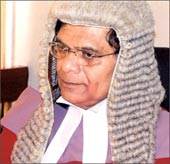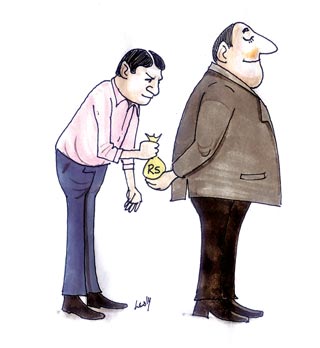Arresting Corruption
|
Speech delivered by Chief Justice Ashoka de
Silva on Anti Corruption Day. Part I was published yesterday
|
 |
Acts of corruption have caused a perception of the meaning of
corruption between normal persons while, there is a different meaning
for corruption of the elites particularly those in public or business
undertakings. Likewise, there is also a misconception of its meaning for
the victim of corruptions and the beneficiaries of corruption acts for
example, a Minister can deviate a project from one point to another for
genuine or vague reasons or another can facilitate some ones aspirations
without merit or irregular means. The beneficiaries of such misconduct
may simply consider it is worthy while the victims argue it corruption.
This shows the flexible nature of corruption.
The meaning of corruption is two fold, legal and social but due to
its complex nature they are both covered in the legal framework to ease
the intervention process.
As stated earlier corruption is a global phenomenon. These
implications bear political, economic, as well as social dimensions. At
political levels, it causes an obstacle to democracy and rule of law.
Corruption creates a situation of political instability by destroying
trust and confidence which are the foundation of political stability.
Economically, corruption ensures selective access to economic
opportunities. Certain groups, families and friends enjoy the lion share
of the national economic cake. This denies the majority entrepreneur
access to economic rights. Most of the money gained through corrupt
means in the Third World is immediately smuggled out to safe havens
abroad. Thus the money is lost to the country. On the other hand if this
money is ploughed back to the domestic productions at least it will have
a less destructive effect.
When corruption is rampant and widespread in central and local
government machinery, it frustrates all efforts of economic growth and
development. Corruption payments made to obtain public services deny the
country valuable revenue.
From social point of view corruption leads to inefficiency. More
often than to resources are misallocated or misappropriated leading to a
direct inefficiency in Government operations.
The impact the corruption causes to State and individuals directly
have prompted the need for the international community and its
institutions to take collective
 measures to alleviate corruption. measures to alleviate corruption.
At international level the effort to fight corruption commend in
1970’s particularly with the enactment of United States Foreign
Corruption Practice Act (FCPA). This Act aimed at regulating business as
a corruption free environment. By them the multinational companies were
the key players in corruption transactions. Hence, the International
Chamber of Commerce (ICC) produce a Code of Conduct designed to be
adopted by multinational companies and corporations.
The UN on the other hand under its agencies such as crime prevention
and criminal justice division made efforts to address several crimes
including corruption. In 1975, the conference of the Fifth Congress on
the Prevention of Crime and the Treatment of Offenders, held in Geneva
came out with a working paper. This paper addressed the threat posed by
economic crimes including corruption to the development of State.
The UN took an active role in addressing corruption at the beginning
of this century. The United Nations Convention against Transnational
Organized Crimes (UNCTOC) was adopted by the General Assembly in
Resolution 55/25 of November 15, 2000, entered into force in 2003. This
convention envisaged criminalization of active and passive bribery
involving public officials, or foreign public official or an
International Civil Servant as well as accomplices. This convention
influenced the coming into being of United Nations Convention against
Corruption (UNCAC) (Adopted by UN General Assembly in October 2003 came
into force on December 14, 2005).
By this convention States are empowered to determine desirable
offences and make them known to other State to attract prosecution of
such officials.
Article 17 provides some of the offences that deserve criminalization
under corruption transgression. They are amongst others, embezzled,
misappropriation of public funds or property, trading in influence.
Abuse of functions, illicit enrichment, laundering of proceeds of
corruption, obstructions of justice, liability of the legal person under
corruption offences, participation and attempt to commit corruptive
offences.
UNCAC also provides for civil measures intended to recover ill-gotten
proceeds from the corrupt culprits or their beneficiaries. For this
matter convention provides for the need to seize, freeze and confiscate
the ill-gotten proceeds.
Due to constrains of time I am unable to discuss the convention and
the implications fully but must say that International Conventions have
so far laid down the basis for corruption interventions.
Political will of the States will have to be exhibited in arresting
corruption within its sovereign limits.
Concluded |



